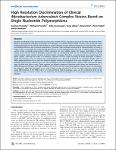High Resolution Discrimination of Clinical Mycobacterium tuberculosis Complex Strains Based on Single Nucleotide Polymorphisms
Homolka, Susanne
Projahn, Michaela
Feuerriegel, Silke
Ubben, Tanja
Diel, Roland
Nübel, Ulrich
Niemann, Stefan
Recently, the diversity of the Mycobacterium tuberculosis complex (MTBC) population structure has been described in detail. Based on geographical separation and specific host pathogen co-evolution shaping MTBC virulence traits, at least 20 major lineages/genotypes have evolved finally leading to a clear influence of strain genetic background on transmissibility, clinical presentation/outcome, and resistance development. Therefore, high resolution genotyping for characterization of strains in larger studies is mandatory for understanding mechanisms of host-pathogen-interaction and to improve tuberculosis (TB) control. Single nucleotide polymorphisms (SNPs) represent the most reliable markers for lineage classification of clinical isolates due to the low levels of homoplasy, however their use is hampered either by low discriminatory power or by the need to analyze a large number of genes to achieve higher resolution. Therefore, we carried out de novo sequencing of 26 genes (approx. 20000 bp per strain) in a reference collection of MTBC strains including all major genotypes to define a highly discriminatory gene set. Overall, 161 polymorphisms were detected of which 59 are genotype-specific, while 13 define deeper branches such as the Euro-American lineage. Unbiased investigation of the most variable set of 11 genes in a population based strain collection (one year, city of Hamburg, Germany) confirmed the validity of SNP analysis as all strains were classified with high accuracy. Taken together, we defined a diagnostic algorithm which allows the identification of 17 MTBC phylogenetic lineages with high confidence for the first time by sequencing analysis of just five genes. In conclusion, the diagnostic algorithm developed in our study is likely to open the door for a low cost high resolution sequence/SNP based differentiation of the MTBC with a very high specificity. High throughput assays can be established which will be needed for large association studies that are mandatory for detailed investigation of host-pathogen-interaction during TB infection.
No license information

